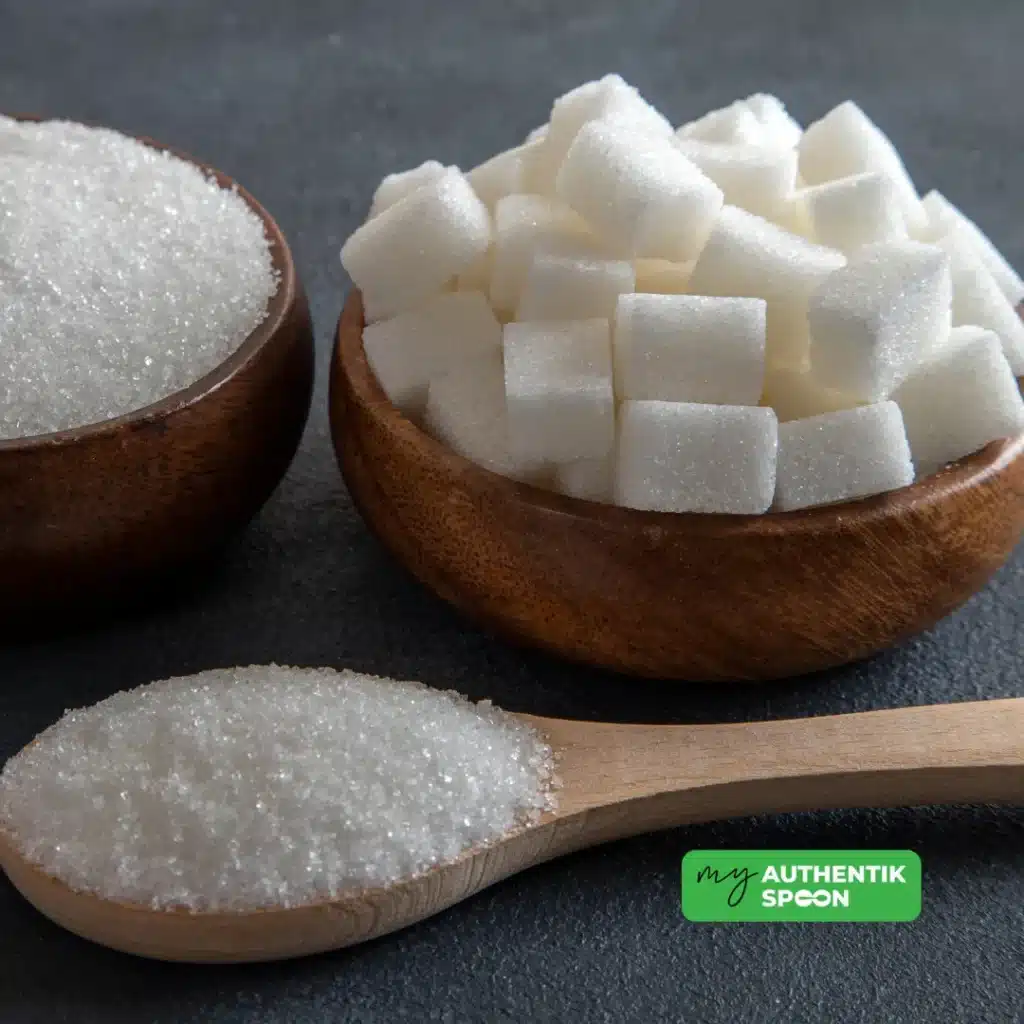
Most people try to lose weight by “cutting sugar,” but the real transformation happens when you understand how different sweeteners actually work inside your body.
Your daily choices, even the small ones like adding honey to your tea, blending dates in a dessert, or choosing stevia for your coffee, shape your metabolism, gut health, cravings, inflammation, and long-term energy.
Healthy sweeteners can support balance, but only when you know how to use them.
In this guide, I’m sharing the questions and options people ask about most during coaching sessions and masterclasses, and what they truly do for your blood sugar, hormones, digestion, and wellbeing.

Why sweetness affects your metabolism more than you think
Your body responds instantly to sweetness, whether it comes from honey, stevia, dates, monk fruit, agave, brown sugar, or artificial alternatives like aspartame.
And that response influences whether you:
- lose weight or gain weight
- feel energetic or fatigued
- manage cravings or feel out of control
- reduce inflammation or fuel it
- support detox or slow it
- balance your hormones or disrupt them
Different sugar alternatives have different effects on gut health, inflammation, and metabolism. Understanding these differences gives you the power to make choices that support your goals.
Natural vs artificial: the big picture
Natural caloric sugar source
These raise blood sugar more quickly:
- refined sugar
- brown sugar
- agave syrup
- coconut sugar
- honey
- maple syrup
- dates and dried fruits

They can be part of a healthy lifestyle when used intentionally.
Natural non-caloric alternatives
These do not raise blood sugar:
- stevia
- monk fruit
They support blood sugar balance, reduce cravings, and help stabilise metabolism.
Artificial sugar substitutes
Including aspartame, sucralose, and acesulfame-K.
These can:
- disrupt the gut microbiome
- trigger cravings
- alter appetite signals
- raise inflammation
- affect insulin sensitivity
They are not recommended for long-term metabolic health.
The hidden risks behind “natural” sweeteners
Agave syrup
Agave is marketed as healthy, but it is extremely high in free fructose.
Free fructose goes directly to the liver, which can contribute to:
- fatty liver
- inflammation
- higher triglycerides
- belly fat
- slow metabolism

Honey: rich in benefits when used with intention
Honey is one of nature’s most nourishing options. It contains antioxidants, enzymes, minerals, and natural antibacterial properties that support immunity, digestion, and overall wellbeing. It also has a gentler impact on the body compared to refined sugar.
However, honey is still a concentrated form of sugar. When used in excess, it can raise blood sugar, trigger cravings, and slow weight loss.
A small amount goes a long way, especially when paired with protein or healthy fats to reduce the glucose spike and maintain stable energy.
Maple syrup
Maple syrup offers antioxidants and minerals like manganese and zinc. But like honey, it still raises blood sugar. It’s best used in small amounts and balanced with fiber or healthy fats.

Dates: a nutrient-rich sweetener when used wisely
Dates are one of the sweeteners we use most often in our recipes. They raise blood sugar, but they also bring fiber, minerals, antioxidants, and nutrients that support digestion, gut health, and sustained energy.
The key is the combination, not just the ingredient.
In my kitchen, I often use dates as the base of sweetness and then adjust the final flavour with a few drops of stevia. This reduces the total sugar load and makes the recipe easier on blood sugar while keeping it delicious and satisfying.
Sugar alcohols: helpful but not always gentle on digestion
Erythritol and xylitol
These options have minimal impact on blood sugar, which helps people working on insulin resistance, weight loss, or diabetes prevention. In general, I don’t recommend them and prefer natural alternatives.
But in excess (more than 15–20 g daily), they can cause:
- bloating
- gas
- cramping
- loose stools
If your gut is sensitive, use these with caution.
Artificial sweeteners: why I don’t recommend them
Artificial alternatives like aspartame and sucralose are widely used, but they can:
- disrupt the gut microbiome
- increase inflammation
- confuse hunger and fullness signals
- raise cravings
- impact insulin response
For long-term metabolic and digestive health, they are best avoided.
A new essential habit: always read the labels
Many people think they’re choosing “healthy” sweeteners… until they read the label.
This is especially important for:
- stevia
- monk fruit blends
- honey
- agave
- maple syrup
- sugar-free products
What you often find on the ingredient list:
- artificial sugars
- fillers
- gums
- preservatives
- emulsifiers
- flavor enhancers
- glucose syrup
- fructose syrup
A product labeled “stevia” might contain very little actual stevia. A bottle of “maple syrup” might be flavored sugar syrup.
To protect your gut health, reduce inflammation, and support metabolism, choose products with the smallest ingredient list possible, ideally just one ingredient.
Your palate can change: why sweetness becomes easier to manage over time
Your palate adapts.
The less sweetness you consume, the less you crave.
The more sweetness you consume, the more your gut bacteria and yeast will ask for sugar.
A balanced palate helps you:
- reduce cravings
- lose weight naturally
- balance your hormones
- improve digestion
- reduce inflammation
- gain energy
- stabilise mood
This is why lowering sweetness gradually creates long-lasting change.
Sweetness, detox, and aging: why balance matters for long-term health
Even natural sweeteners can affect health when used in excess. Too much sweetness can:
- slow detox pathways
- increase inflammation
- overload the liver
- disrupt hormone balance
- fuel cravings
- affect sleep
- accelerate aging
- make weight loss harder
Healthy sweeteners support wellbeing when used mindfully.
Practical swaps you can start today
- Use dates as your main sweetener and adjust flavour with a few drops of stevia
- Replace agave with a small amount of honey or maple syrup
- Choose pure stevia or monk fruit without additives
- Add fat or fiber (nuts, chia, tahini, coconut) to slow glucose absorption
- Keep dried fruit portions small
- Avoid artificial sweeteners
- Reduce sweetness gradually to retrain your palate
These changes support weight loss, gut health, hormone balance, metabolism, and stable energy.
Want guidance to make these habits feel easy?

Doors are closed right now, but you can join the waitlist.
Join the Authentik Reset Membership waitlist and be the first to know when doors open again. Doors only open for a few days at a time so we can fully focus on welcoming and guiding each new member with the care and attention they deserve.
It’s your space to learn, reset, and feel empowered with expert support, no quick fixes, just lasting change.
Let’s continue learning & growing together!
• Explore our blog for naturopathic recipes and wellness advice.
• Sign up for our newsletter to receive exclusive health content straight to your inbox.
• Share your thoughts and comments on social media and tag us with #myauthentikspoon
About the author

Asmaa Lahlou is the co-founder of MyAuthentikSpoon, a naturopathic program dedicated to empowering individuals to make smarter food choices for improved well-being. If you’re ready to tackle wellness with a fresh perspective, schedule a complimentary private consultation with Asmaa to receive personalised dietary insights and weight management strategies. This is your opportunity to have your questions answered and to learn how to incorporate the food choices into your lifestyle and achieve a better wellbeing.
Related posts:
- Healthy Matcha Cheesecake Recipe: 0 Sugar and Ton of Love
- 5 essential health benefits of the sourdough kimchi pancakes – your new morning boost!
- 5 powerful reasons to try this awesome Flour-Free, Flat-Belly, High Protein bread
- How these amazing baked falafel became my go-to anti-inflammatory street food

